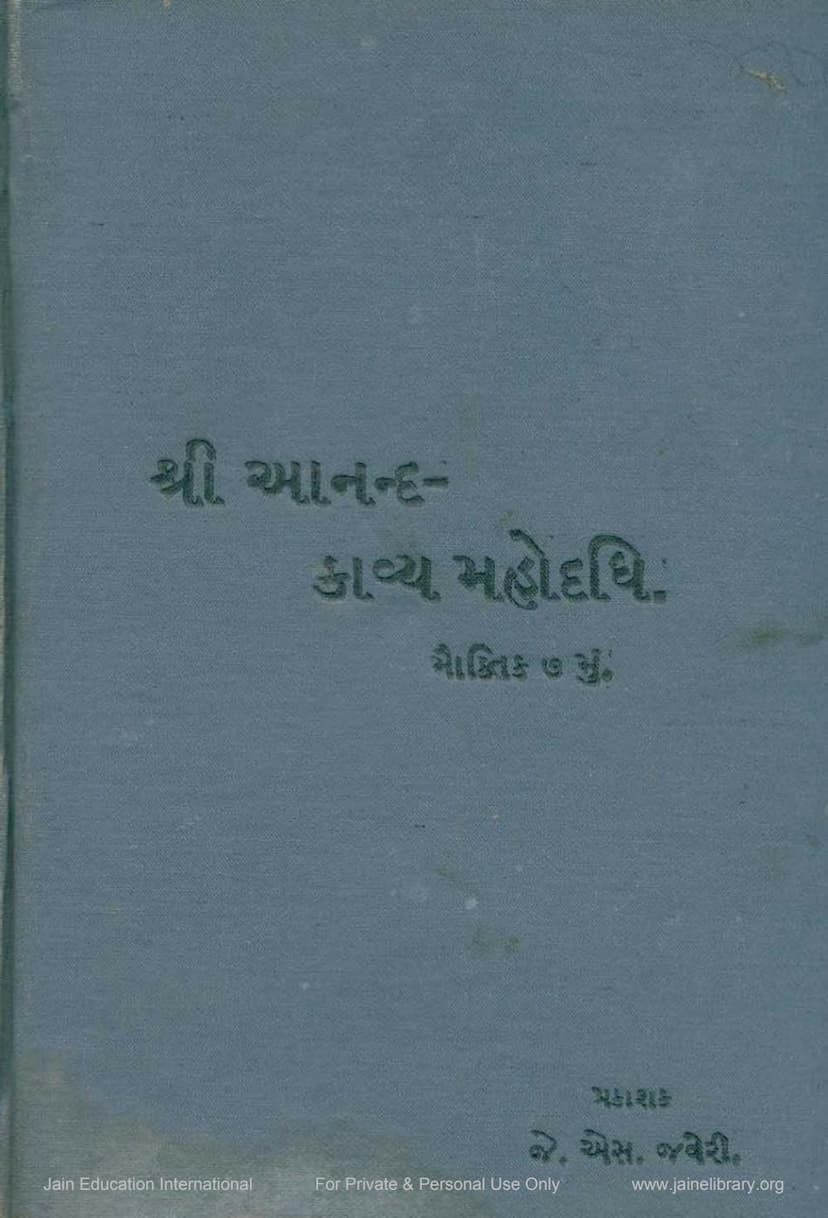Anand Kavya Mahodadhi Part 7
Added to library: September 1, 2025

Summary
This document is the seventh volume of the "Anand Kavya Mahodadhi," a collection of ancient Jain poems, compiled and researched by Muni Shree Sampatavijay and published by Jivanchand Sakerchand Javeri for the Sheth Devchand Lalbhai Jain Pustakoddhar Fund. The title translates to "Ocean of Joyful Poetry."
Key information about the book:
- Title: Anand Kavya Mahodadhi (Ocean of Joyful Poetry)
- Part: 7th Volume
- Compiler/Researcher: Muni Shree Sampatavijay
- Publisher: Sheth Devchand Lalbhai Jain Pustakoddhar Fund
- Published by: Jivanchand Sakerchand Javeri, Bombay
- Year of Publication: 1926 AD (Vikram Samvat 1982, Phalgun 1982)
- Rights: All rights reserved by the Trustees of the Fund.
- Price: Rs. 1-9-0
Content Overview (based on the provided pages):
The document primarily consists of introductory and biographical information related to the publication and its contributors, along with the beginning of a collection of poems.
-
Introduction and Dedication:
- The publication is dedicated to Late Mr. Chimanlal Dayabhai Dalal, M.A., who is praised for his deep scholarship in Jain literature, his extensive work in ancient Jain and Sanskrit texts found in libraries in places like Jaisalmer, Patan, and Chhani. He is credited with bringing many rare and unpublished works to light through the generous patronage of Maharaja Sayajirao Gaekwad of Baroda. His dedication and contribution to scholarship are highly lauded.
- The book is presented as a small tribute to his valuable services in the field of ancient literature, history, and philosophy.
-
Biographical Sketch of Chimanlal Dayabhai Dalal:
- A detailed biographical account of Chimanlal Dayabhai Dalal is provided. It highlights his birth in Kaira in 1881, his middle-class family background, and his father's encouragement for higher education.
- Dalal is described as having a quiet and focused nature from childhood, preferring seclusion and the company of books. He had a strong devotion to the Jain faith, visiting temples daily and developing a deep interest in Jain scriptures through his association with Jain monks.
- His academic achievements are noted, including passing matriculation with good marks and excelling in his B.A. (English and Sanskrit literature) and M.A. (Sanskrit grammar) examinations.
- His career path in librarianship is detailed, starting with training at the Baroda Central Library and his subsequent role in organizing and classifying library collections.
- A significant portion of his work involved the search, inspection, and cataloging of ancient Jain manuscripts from Bhandars (collections) in Pattan and Jesalmer. His meticulous work in these repositories is highlighted, including the discovery of valuable Apabhramsa literature crucial for understanding the history of Hindi, Gujarati, and Marathi languages.
- His contributions to the "Gaekwad's Oriental Series" are mentioned, with him editing several significant works.
- His untimely death due to influenza is deeply lamented, and his potential for further contributions to Jain literature and history is recognized as a great loss.
- His personal qualities are described as quiet, humble, disciplined, and devoted to a simple, scholarly life, akin to that of a Jain monk.
-
Foreword/Appreciations:
- A foreword by Keshawlal Harshadbhai Dhruv emphasizes the importance of publishing old Jain poetry for the study of old Gujarati literature, noting that Jain literature is crucial for shedding light on the period before the 15th and 16th centuries. urged to continue the publication for the benefit of readers and researchers.
- A quote from Professor B.C. Bhattacharya from Benares is included, praising the preservation and meticulous care of Jain manuscript collections in Bhandars, contrasting it with how Hindus might let such manuscripts perish or sell them due to lack of public interest.
- Jivan, in a reflective note, compares the collector of poems to a gardener gathering pearls and weaving a garland, emphasizing that the true appreciation and blossoming of poetry come from scholars and the wise.
-
Contents of the Volume (Part VII):
- A detailed index or table of contents is provided, listing various articles and their respective authors. These include:
- A "Smran Patrika" (Remembrance Chronicle) dedicated to the late Chimanlal D. Dalal.
- An "Avatarnika" (Introduction/Preface).
- Biographical sketches and works of poets like Kavi Shree Samaysundar, Pandit Jayvijay, and Kushallabh Upadhyaya.
- Discussions on specific literary works like "Madhavanal Kamakandala's Folk Tale," "Madhavanal's Story," "Stambhan Parshvanath Stavan," "Shakun Chaupai – Subject Index," "Shakunstrology Chaupai," and "Nakshatra Swadhyay."
- References to "Char Pratyekbuddha Chaupai" by Samaysundar and "Tebla" (likely a typo for Teba, meaning treatise or essay) by Jayvijay.
- A detailed index or table of contents is provided, listing various articles and their respective authors. These include:
-
Specific Content Focus:
- The majority of the provided text consists of the detailed biographical essay about Chimanlal Dayabhai Dalal, likely written by J.S. Kudalkar.
- There are also significant portions dedicated to introducing and analyzing the works of Kavi Shree Samaysundar and Pandit Jayvijay, including their biographical details, their religious affiliations (Gachhas), their contributions to literature, and the context of their times (e.g., the political and religious climate during the Mughal era for Samaysundar).
- The text delves into the linguistic analysis of some poems, particularly noting the influence of Marwari language in the works of Kushallabh Upadhyaya.
- There are extensive quotes and references to other literary works and scholars, indicating a scholarly and research-oriented approach to the compilation.
- The document also includes samples of the poetry itself, particularly from "Maru Dhola ni Chaupai" and "Madhavanal Kamakandala," showcasing lyrical verses and narrative elements.
In essence, "Anand Kavya Mahodadhi Part 7" is a scholarly compilation that not only presents ancient Jain poems but also provides valuable context through biographical essays and historical analysis of the poets and their works, with a particular focus on the life and scholarly contributions of Chimanlal Dayabhai Dalal.